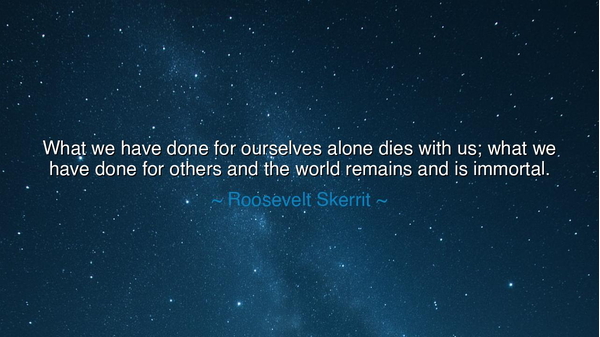
What we have done for ourselves alone dies with us; what we have
What we have done for ourselves alone dies with us; what we have done for others and the world remains and is immortal.






"What we have done for ourselves alone dies with us; what we have done for others and the world remains and is immortal." These words, uttered by Roosevelt Skerrit, echo a timeless truth that reverberates through the ages. In the fleeting dance of life, it is not the riches we accumulate nor the accolades we collect for ourselves that endure. No, it is the selfless acts we perform for others, the contributions we make to the betterment of the world, that transcend the passage of time and death. The immortality Skerrit speaks of is not that which is tied to material gain, but rather the legacy of service and love we leave behind.
In this world of swift winds and changing tides, it is easy to forget the impermanence of life. Each of us is but a fleeting shadow in the great expanse of time. Our individual pursuits—though perhaps significant in their moment—are like whispers in the wind, soon forgotten. Yet, when we pour our hearts into the service of others, when we sow seeds of goodness that grow beyond our lives, we become part of something eternal. The legacy we leave is not bound by the limitations of our mortal existence but is woven into the very fabric of the world, long after our final breath.
Consider, if you will, the example of Mahatma Gandhi, whose life was dedicated not to personal gain but to the liberation of his people. Gandhi’s sacrifice, his selfless pursuit of justice, was not driven by a desire for recognition or power. Rather, it was rooted in a deep love for humanity, and this love transcended time. Though his body is no longer with us, his teachings of non-violence, peace, and resilience have shaped generations and continue to inspire the world. Gandhi did not live for himself; he lived for others, and in doing so, his legacy remains immortal.
Similarly, the story of Florence Nightingale, the founder of modern nursing, is one of profound selflessness. Nightingale’s commitment to the care of the sick, her tireless work during the Crimean War, and her development of sanitary practices in hospitals were not for her own glory, but for the health and well-being of others. She sacrificed her own comforts, dedicating her life to a cause greater than herself. Her name is etched forever in the annals of history, not for what she acquired, but for what she gave to the world—a gift that remains.
In contrast, those who live solely for their own gain, accumulating wealth and power without regard for the welfare of others, may find that their legacy is like dust in the wind. King Midas, whose touch turned all to gold, learned this bitter truth in the ancient fable. Though he amassed great wealth, he found that it brought him no true joy, no immortality. In the end, the gold was forgotten, as his selfishness brought him only despair. The lesson is clear: personal gain, when pursued at the expense of others, fades and dies with the individual. It is only selflessness that ensures our lives have true meaning.
Thus, the great lesson of Skerrit’s words is this: to live a life of purpose is to live for others. The immortal legacy is not found in what we do for ourselves, but in what we do for the world around us. Let us be like those who came before us, who lived with courage, compassion, and wisdom. Let our actions, big or small, echo down the corridors of time, impacting generations that will never know our names, yet feel the effects of our deeds.
In your own life, reflect upon what you can offer to others. Whether it is a kind word, a helping hand, or a great act of service, know that these are the things that will endure. Strive not for fame or riches, but for a world made better by your presence. For, in the end, it is not what we have done for ourselves that counts, but what we have done for others—and that, indeed, is immortal.






AAdministratorAdministrator
Welcome, honored guests. Please leave a comment, we will respond soon